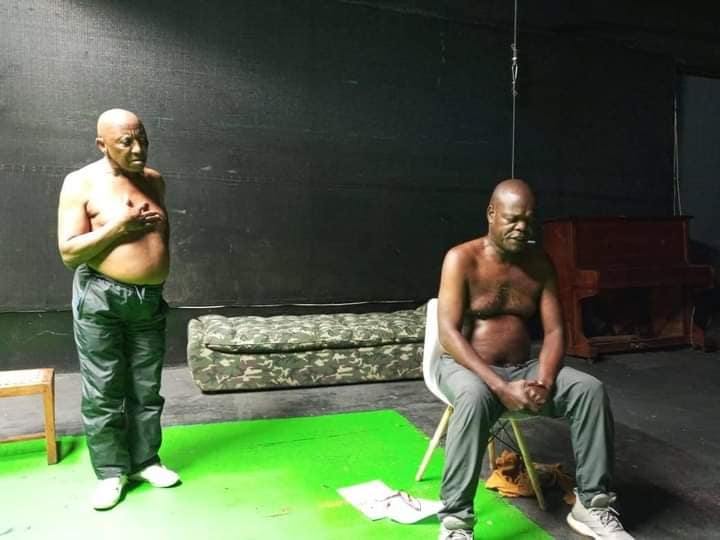Unimaginative and Disorganised: A Review of O Tseleng Jeso

Writer, activist and art critic Tshiamo Malatji walked out of O Tseleng Jeso almost a year ago when it showed. Finally, he has decided to tell us why he couldn’t stand the production.
Two burly Black men put sport balls on their bellies under their shirts and proceeded to sit on chairs and caricatured pregnant Black womxn. It was at this point, with the audience overcome in laughter, that me and my friend stood up and left. It was on the third night of O Tseleng Jeso, a comedy production showing at the Mangaung Civic Theatre. Our walkout was a public statement that we need to think differently about Black comedy, outside of the degrading humiliation of the horrors of our lives, but more importantly, to be conscious of the norms we empower.
Produced by Mzwakhe Khachela, O Tseleng Jeso starred veteran actors Jerry Phele and Seputla Sebogodi, who cast away almost all theatrical sensibility in an absurd slapstick comedy show, most comparable to the disorganised incarnation of a primary school year play. The entire showcase was disjointed from any central storyline, instead favouring a series of half-executed skits by two men who mostly berate each other and tell stories. To be fair, Samuel Beckett’s Waiting for Godot is a very similar comedy where two characters do nothing. However, O Tseleng Jeso is much less trying to be a play about nothing and is more aptly simply achieving the fact of being a play about something enormously silly.
But more seriously, the play does have something to offer; the serious issues of Black life are presented as comedy. In the skit with the pregnant womxn, Phele stated that they would not embark on a trip for a necessity because it would be arduous. The audience laughed. They laughed, not at the sad state that Black people struggle to travel, but rather at the man with a high-pitched voice sitting with their belly up on a chair in a whining voice. Phele seemed to take cues here from Lele Ledwaba’s character, Pinkie, in sitcom Stokvel. Next to him, Sebogodi sat with his pinky up, mimicking an even worse caricature. Sebogodi was supposedly funny because he was fussy and pretended to be higher-class (as noted by the pinky) while being obviously poor and helpless. The character was meant to be funny due to dramatic irony — when the audience knows something that the character does not. It is the same way we elicit laughter from mimicking Black people with urban accents. The suggestion is that blackness is funny if ever it escapes the conditions it is placed within.
Some of these skits were related to the central issues of Black life, such as poverty and racism, and it became very clear as the production continued that these serious issues were sources for comedic relief in ways that demean Black people. For instance, in one skit Phele boldly proclaims “Boloyi! Boloyi!” cuing the audience to laugh. The joke here seemed to merely be that Sebogodi was being ridiculous, and as such cursed by evil spirits. Phele did not have to say much more than this single word repeatedly to make the joke, because African traditional beliefs are commonly associated with laughing stock.
At one point, Sebogodi stood on the far right of the stage and began an excruciating monologue, pretending to be a Coloured person in Cape Town who will stab someone if they come to Mitchell’s Plein. The audience, once again, laughed. This skit perpetuated the common caricature of Coloured identity as irrational, undereducated and violent. There was no joke told. Fifty eight (58) people are killed daily in South Africa, including in very dangerous communities in Cape Town. Certainly, hopefully, this fact is not what the audience was laughing at—it is no humorous matter. Sebogodi was being ridiculous in the way he portrayed this Coloured person. Therein lay the basis for this showcase. It made fun of the vulnerable and oppressed. It punched down on Blackness.
There is a place for satire in a world subjected to suffering. It can remove us from our positions of misery and introduce joy. It is able, especially, to make fun of the people with power, and by making the powerful seem ridiculous, reduce the threat of their power. Punching upward is itself a revolutionary force of comedy. The opposite can be just as destructive, especially to the communities we should be caring about. Norms that womxn whine and Coloured people stab are not good norms to establish in society. They play into the interests of people in power. For instance, Coloured people are disproportionately represented in South Africa’s prisons and violence against womxn is neglected, despite continuous efforts to speak out against it. Here, comedy can reinforce very dangerous ideas in the audience, which affects the social organisation of Black people, pushing us to remain in our suffering.
Thinking of the title of the production, I sense a serious hopelessness. The joke here seemed to be that Jesus is never going to come. We will never be saved. There was no imagination in the construction of this show. The jokes were mostly funny because we had heard them all before. They were all low-hanging fruit. The same jokes we make while sitting around a table in a tavern or on lunch breaks at work. There was nothing new, creative or necessary about this work. In fact, the execution of the show was the same. It ran along like a play that was constantly falling apart. It appeared like an unrehearsed off-the-cuff mess that we would expect from first-time teenage actors. Events were all sudden, changed quicker than we could realise and were fundamentally unexplained. Premises escaped as quickly as they entered. It was an aberration that audiences were even charged R80 to see such a disaster-class under-workshopped production.